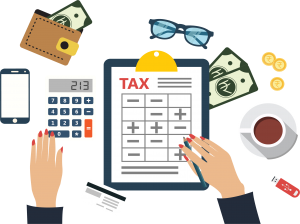Income Tax Filling
Prices Starting from INR 1499/- only.
Timeline – 1 Working days
(No Hidden Cost)


An income tax return is a process where taxpayers (ie., organisations/individuals) have to file their taxable incomes from all the sources, eligible deductions and tax expenditures if any. This is called the Income Tax Returns (ITR) Filing process.
Income tax return (ITR) forms vary from ITR-1 to ITR-7, which is used for different categories of income and different categories of entities. Depending on the category of forms, there are many disclosure requirements. Filing Income Tax Return (ITR) in India is entirely paperless and online. There is no essential for you to submit physical documents at the income tax offices. All documents, all necessary documents need to be submitted online. Income tax return (ITR) is to be filed for a specific Financial Year (i.e. April to March) regardless of Accounting Year accepted by you.
Taxes in India can be classified as direct and indirect taxes. Direct tax is a tax you paid on your income directly to the Government of India. Indirect tax is a tax that is collected by some third party on your behalf and pays the tax to the Government of India eg: theatres, restaurants, and e-commerce providers collect taxes from you on goods you purchase. This tax is, in return, paid to the government. Direct Taxes are classified as Income Tax and Corporate Tax.
The income received by the individuals and organisations is subject to tax. The tax collected on the income of an individual is Income tax, which is collected by the Central Government. Such tax on income received is due in the same financial year wherein it is accumulated in the form of advance tax. But the notification and calculation of the income and also the tax liability is provided in the assessment year. This notification form is called Income Tax Return (ITR). The form and time frame for filing Income Tax Returns (ITR) are different from case to case based on the criteria.
| Income Threshold | Tax rate applicable |
|---|---|
| Up to ₹ 2,50,000 | NIL |
| ₹ 2,50,001 to ₹ 5,00,000 | 5% on income exceeding Rs. 2.5 lakh (max. Rs. 12,500) |
| ₹ 5,00,001 to ₹ 10,00,000 | 20% on income exceeding Rs. 5 lakh (max. Rs. 1 lakh) + Rs. 12,500 |
| Over ₹ 10,00,000 | 30% on income exceeding Rs. 10 lakh + Rs. 1 lakh + Rs. 12,500 |
| Income Threshold | Tax rate applicable |
|---|---|
| Up to ₹ 2,50,000 | NIL |
| ₹ 2,50,001 to ₹ 5,00,000 | 5% on income exceeding Rs. 2.5 lakh (max. Rs. 12,500) |
| ₹ 5,00,001 to ₹ 10,00,000 | 20% on income exceeding Rs. 5 lakh (max. Rs. 1 lakh) + Rs. 12,500 |
| Over ₹ 10,00,000 | 30% on income exceeding Rs. 10 lakh + Rs. 1 lakh + Rs. 12,500 |
| Income Threshold | Tax rate applicable |
|---|---|
| Up to ₹ 5,00,000 | NIL |
| ₹ 5,00,001 to ₹ 10,00,000 | 20% on income exceeding Rs. 5 lakh (max. Rs. 1 lakh) |
| Over ₹ 10,00,000 | 30% on income exceeding Rs. 10 lakh + Rs. 1 lakh |
The tax rate applicable for Local Authorities is on a flat rate of 30%.
- Surcharge: In case income is more than ₹ 1 crore, the surcharge is applicable @ 12% over income tax amount.
- “Health and Education Cess” at the rate of 4%, on the amount of tax computed, inclusive of surcharge.
| Income Threshold | Tax rate applicable |
|---|---|
| Up to ₹ 2,50,000 | NIL |
| ₹ 2,50,001 to ₹ 5,00,000 | 5% on income exceeding Rs. 2.5 lakh (max. Rs. 12,500) |
| ₹ 5,00,001 to ₹ 10,00,000 | 20% on income exceeding Rs. 5 lakh (max. Rs. 1 lakh) + Rs. 12,500 |
| Over ₹ 10,00,000 | 30% on income exceeding Rs. 10 lakh + Rs. 1 lakh + Rs. 12,500 |
| Income Threshold | Tax rate applicable |
|---|---|
| Up to ₹ 3,00,000 | NIL |
| ₹ 3,00,001 to ₹ 5,00,000 | 5% on income exceeding Rs. 3 lakh (max. Rs. 10,000) |
| ₹ 5,00,001 to ₹ 10,00,000 | 20% on income exceeding Rs. 5 lakh (max. Rs. 1 lakh) + Rs. 10,000 |
| Over ₹ 10,00,000 | 30% on income exceeding Rs. 10 lakh + Rs. 1 lakh + Rs. 10,000 |
The applicable tax rate for any Partnership Firms & Limited Liability Partnerships (LLP) is at a flat rate of 30%.
- Surcharge: In case income is more than ₹ 1 crore, the surcharge is applicable @ 12% over income tax amount.
- “Health and Education Cess” at the rate of 4%, on the amount of tax computed, inclusive of surcharge.
The tax rate applicable for any Domestic Companies is at a flat rate of 30
Surcharge: In case income is between ₹ 1 crore and ₹ 10 crores, the surcharge is applicable @ 7% of the income tax amount.
If the amount exceeds ₹ 10 crores, the surcharge payable is at a rate of 12%.
Health and Education Cess: ““Health and Education Cess” at the rate of 4%, on the amount of tax computed, inclusive of surcharge.
Minimum Requirements
- If the gross total income exceeds 2,50,000 in case of senior citizen if gross total income exceed 3,00,000,in the case super senior citizen the limit is 5,00,000
- Company or firm case irrespective of income
- Claim income tax refund
- Carry forward loss under the head of income
- If the resident individual having asset outside India.
Documents Required
- Pan card of the individual
- Aadhar card of the individual
- Mobile number and email id of individual for income tax registration
- Bank statement of the individual
- Form 16 in the case of salary individual and form 16A other than salary individual
SILVER
.
ITR 1 AND ITR 2
– Pan card of the individual
– Aadhar card of the individual
– Form 16 or bank statement of the individual
– User id and password of the efiling income tax website
– 26AS statement
.
₹ 1500/-
(All Inclusive)
GOLD
.
ITR 4
– PAN card of the individual
– Aadhar card of the individual
– Form 16A
– Bank statement of the individual
– Other details regarding other source of income
– Form 26AS
.
₹ 2000/-
(All Inclusive)
PLATINUM
.
ITR 3
– PAN card of the individual
– Aadhar card of the individual
– Form 16A
– Bank statement of the individual
– Form 16A
– GST return copy like 3B return and GSTR 1 return
– Confirmation balance of sundry debtors and confirmation balance of sundry creditors
– Details of purchase and sales including service bill also.
.
₹ 3500/-
(All Inclusive)
 1
1Collect details from the individual
 2
2Register in income tax e-filing website
 3
3Upload or submit the relevant ITR of the assess
 4
4Signed and send to Bangalore income tax acknowledgement or e-verify income tax return
 5
5Income tax return received or E-verify accepted
 6
6Income tax return processed
For individual, HUF and other person whose accounts are not required to be audited the due date of income tax return is 31st july and in the accounts are required to be audited is 30th September.
Section 234F which come into effect with effect from 1st April 2017.
If you fail to file income tax return you have to pay penalty upto for Rs.10000 after December.
But before 31st December the penalty amount upto for Rs.5000 only. But in the case of income of the individual is less than 5, 00,000 the penalty amount would be 1000 upto 31st December. But after 31st December the penalty amount would be for Rs.5000/-.
- A person resides in India 182 days in a year
- In addition he must reside in India for a minimum 60 days in the current financial year.
- Resident in India
- Resident but ordinarily in India
- Nonresident in India
The maximum limit is 1, 50,000 for the deduction claimed u/s 80CCC.but they have to file income tax return within due date prescribed u/s 139(1) of the income tax Act 1961.

